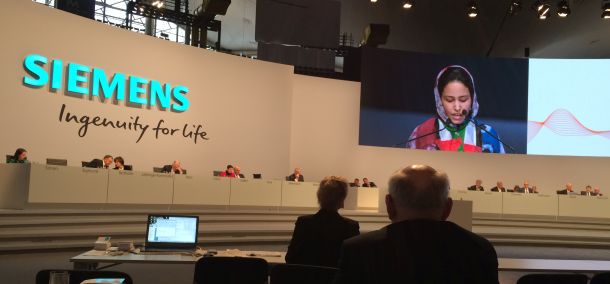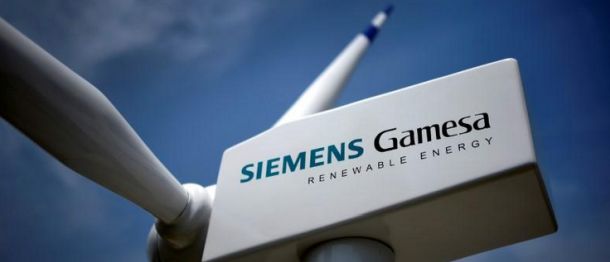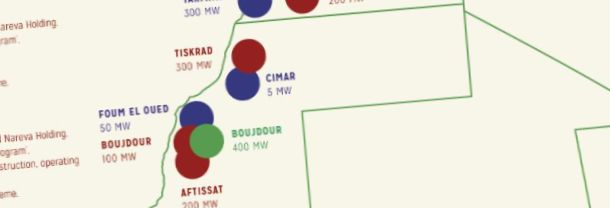
The German government has clarified that its financial support for Siemens Energy will include a provision excluding the firm’s projects in “Moroccan-occupied Western Sahara”.
PHOTO: The arrival of the first big consignment of windmills of the Siemens family into occupied Western Sahara in 2013 - providing energy for Morocco's illegal exports of conflict minerals. Siemens Energy and Siemens Gamesa have entered into several contracts in the territory since.
“The German government does not support projects in Western Sahara.” […] “In the course of further negotiations and in the context of structuring the guarantee modalities and conditions, we will ensure that the provision of avals from the credit line guaranteed by the Federal Government in the Moroccan-occupied Western Sahara are excluded.”
This is the response that the German Ministry for Economy and Climate Protection sent on 15 November 2023 to German Member of Parliament Ali Al-Dailami (DIE LINKE) who had inquired whether the potential support that the government would grant to Siemens Energy would extend to the firm’s projects in occupied Western Sahara.
Siemens Energy has ended up in financial dire straits following its acquisition of its Spanish subsidiary Siemens Gamesa Renewable Energy (SGRE). The company has announced a record loss of €4.6 billion for the last financial year.
To bounce back, Siemens Energy has sought financial support from the German Government. Reports in German Media indicate that an agreement was reached mid-November. Private banks will supply guarantees of €12 billion, of which €7.5 billion are reassured by bonds of the German government.
It would appear that particularly SGRE's wind energy projects have been a major factor in Siemens Energy's current financial crisis - to the extent that the provided financial aid will mostly be earmarked for the needs of SGRE's renewable sector.
Given the involvement of more than one branch of the Siemens family in Morocco's renewable energy projects in occupied Western Sahara, there was a need to clarify whether German state funding would go towards any of these projects.
"We welcome the clarification of the German government. It is a clear sign to Siemens Energy and all other companies involved that pursuing business in illegally occupied Western Sahara entails serious international law concerns. We continue to encourage Siemens Energy to finally stop its support of the Moroccan occupation by ending its activities in Western Sahara”, Tim Sauer from WSRW Germany comments. “It remains to be seen how the German government will implement its stated position in more detail in the ongoing negotiations.”
All four currently operational wind farms in occupied Western Sahara have a connection to the Siemens company family:
- The 5 MW privately owned CIMAR wind farm, supplying energy to the cement grinding factory owned by HeidelbergCement, runs on turbines provided by Gamesa (which later merged into Siemens Gamesa, itself now fully controlled by Siemens Energy).
- The 50 Foum El Oued wind farm consists of mills supplied by Siemens.
- The 200 MW Aftissat wind farm, to which Siemens Gamesa provided parts.
- The 200 MW Boujdour wind farm, running on SGRE turbines, became operational in July 2023.
Another planned 100 MW wind farm (Tiskrad farm) will also be equipped by Siemens. For each of these farms, except the privately owned CIMAR farm, Siemens has been in cahoots with Nareva, the wind energy company that is owned by the king of Morocco.
The position taken by the German government in relation to the financial injection of Siemens Energy, aligns with its previous statements regarding projects in Western Sahara. Most notably, it had announced in 2017 in relation to projects of the then responsable parent company Siemens AG, that “German government does not support any economic activities of German companies in Western Sahara and does not secure business through export credit and investment guarantees”.
Three-quarters of Western Sahara have been illegally occupied by Morocco since 1975. The UN treats the case as an unfinished decolonisation, and considers the territory as non-self-governing, without an administering power in place.
Since you're here....
WSRW’s work is being read and used more than ever. We work totally independently and to a large extent voluntarily. Our work takes time, dedication and diligence. But we do it because we believe it matters – and we hope you do too. We look for more monthly donors to support our work. If you'd like to contribute to our work – 3€, 5€, 8€ monthly… what you can spare – the future of WSRW would be much more secure. You can set up a monthly donation to WSRW quickly here.
Siemens again refuses to answer questions about Western Sahara at AGM
For the fourth consecutive year, the German engineering company dodges questions at its Annual Shareholders Meeting as to whether it has obtained the consent of the people of Western Sahara to operate on their land.
Siemens fails to respond Western Sahara question at AGM
Why did you not seek permission from my people?, a Saharawi refugee asked at Siemens AGM. Company fails to answer questions why it operates on occupied land.
Siemens: the Moroccan king's wind turbine supplier in Western Sahara
WSRW has again asked Siemens to clarify how they’ve obtained the consent of the people of Western Sahara to their involvement in literally all of Morocco’s wind power plans in the occupied territory.
Moroccan wind energy in occupied Western Sahara passing 40%
Even more wind farms are being planned in occupied Western Sahara, and all of them are in the portfolio of the Moroccan monarch's company NAREVA.



